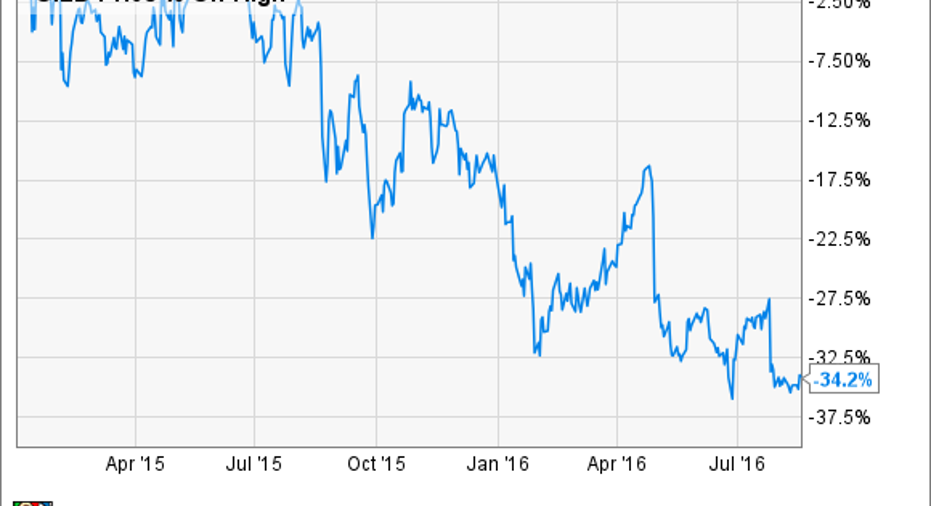Here's Why a Gilead Stock Split Is Unlikely

Image source: Getty Images.
Many investors get excited when a company announces that it will be splitting its stock, seeing it as a chance to buy into a prosperous company at a "low" price. After all, a "high" stock price can create apsychological barrier that keeps some investors away,which is one reason companies often decide to split their stock in the first place.
With shares of Gilead Sciences (NASDAQ: GILD)currently trading for a "high" dollar amount close to triple digits, you might be wondering if the biotech giant is going to announce a stock split soon. After all, Gilead Sciences has a history of splitting its stock on a 2-for-1basis every couple of years, so what's stopping it from doing it again?
Gilead stock split history
| Date | Ratio |
| 02/22/2001 | 2 for 1 |
| 03/08/2002 | 2 for 1 |
| 09/07/2004 | 2 for 1 |
| 06/25/2007 | 2 for 1 |
| 01/28/2013 | 2 for 1 |
Data source: Yahoo! Finance.
While the answer to that question is that absolutely nothing is preventing the company from choosing to split its stock, here are two big reasons I don't think it will happen anytime soon.
Gilead's share price has been heading in reverse
Stock splits tend to take place after a company's share price has experienced a strong upward move, which typically occurs following a series of positive earnings announcements, or from general excitement about the company's future.
While Gilead's long-term history has been unbelievably bright, the company's recent past hasn't been so great. Shares have been selling off for more than a year now, and they are currently down more than 34% from last year's highs.
It's not hard to understand why shares have been heading in reverse. The company's cash-cow hepatitis C business -- which has been the primary revenue driver over the last few years -- looks like it has already peaked. That is going to make it hard for the company to grow its top line in the years ahead, which is a major reason traders have been jumping ship.
That doesn't necessarily mean that shares are going to stay down for good -- I wouldn't be a shareholder if I thought they would -- but since the company's stock has a long climb ahead before it can reach its former high, I have a hard time believing that a stock split is in the cards right now.
Gilead's peers are trading in the triple digits
No company exists in a vacuum, and investors often compare companies against each other when they are considering investment decisions. Gilead is certainly aware of that, so the company is likely to take its cues from what other large biotech stocks are doing when it thinks about splitting its stock.
With that in mind, here's a look at some recent share prices ofthe biggest biotech companies on the market today, and the last time they decided to split their stock.
| Company |
ClosingPrice,8/18/2016 |
Year of LastSplit |
| Alexion Pharmaceuticals | $132.80 | 2011 |
| Amgen | $175.08 | 1999 |
| Biogen | $313.37 | 2001 |
| Celgene | $112.25 | 2014 |
| Regeneron Pharmaceuticals | $411.05 | N/A |
Data source: Yahoo! Finance.
As you can see, all of these companies have seen their share prices rise into the triple digits, yet only Celgene (NASDAQ: CELG) has felt the urge to split its stock in the past few years.
Since investors who are interested in Gilead are probably looking at these other companies too, the company is not likely to feel pressure to split its stock. After all, Gilead is actually the lowest-priced stock of the group.
Why it doesn't matter
I certainly understand the allure and excitement that comes from an announced stock split, but it's important to remember that the intrinsic value of a company does not change at all after a stock split is performed. The market capitalization, revenue, profits, P/E ratio, balance sheet, management team, future prospects, product pipeline -- basically, everything remains exactly the same both before and after a stock split.
If you're interested in Gilead's stock, don't let the high share price scare you away. Instead, try to stay focused on the fact that it has a rock-solid balance sheet, an interesting pipeline, and a 2.3% dividend yield, and it's only trading for 7 times trailing earnings.
A secret billion-dollar stock opportunity The world's biggest tech company forgot to show you something, but a few Wall Street analysts and the Fool didn't miss a beat: There's a small company that's powering their brand-new gadgets and the coming revolution in technology. And we think its stock price has nearly unlimited room to run for early in-the-know investors! To be one of them, just click here.
Brian Feroldi owns shares of Alexion Pharmaceuticals, Celgene, and Gilead Sciences; Brian Feroldi and the Motley Fool own shares of Regeneron Pharmaceuticals.The Motley Fool owns shares of and recommends Biogen, Celgene, and Gilead Sciences. The Motley Fool has the following options: short October 2016 $95 puts on Celgene and short October 2016 $85 calls on Gilead Sciences.
Like this article? Follow Brian onTwitter where he goes by the handle@Longtermmindsetor connect with him on LinkedIn to see more articles like this.
Try any of our Foolish newsletter services free for 30 days. We Fools may not all hold the same opinions, but we all believe that considering a diverse range of insights makes us better investors. The Motley Fool has a disclosure policy.



















